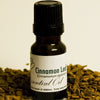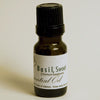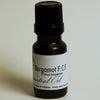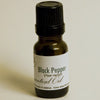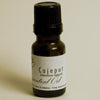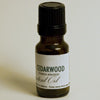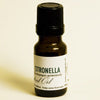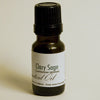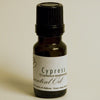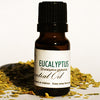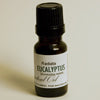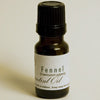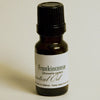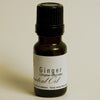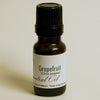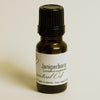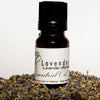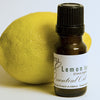Essential Oils
-
Cinnamon Leaf $ 8.99
Stimulating oil that is excellent for exhaustion. Very strong antiseptic oil therefore useful for preventing infection. A warming oil effective for easing muscular aches and pains. Not recommended for skin care. Cinnamon BARK should not...
-
Basil, Sweet $ 16.99
The French (European) Basil is also known as Sweet Basil which has a higher percentage of linalool and is safe to use in aromatherapy. This aromatic plant is steam distilled using the flowering tops and...
-
Bergamot, F.C.F. $ 19.99
Bergamot is the flavouring for Earl Grey tea and an ingredient of eau de cologne and other perfumes, room sprays and toiletries. Bergamot is grown in Italy for its essential oil and cannot be propagated...
-
Black Pepper $ 20.99
One of the oldest spices used in flavouring. Warming and stimulating to body and mind. Piper nigrumFamily: PiperaceaeSource: IndiaPrecautions: Potential skin irritant – use in moderationMethod of use: Massage, VaporizationNote: MiddleBlends well with: Basil, Bergamot,...
-
Cajeput (White Tea Tree) $ 12.99
Stimulating oil that helps put body and mind back to balance. Excellent for the respiratory, infections such as cold, laryngitis and bronchitis.Useful for its clearing properties. Its antiseptic properties make it useful for acne and...
-
Cedarwood Atlas $ 11.99
Cedarwood is warming, calming and soothing for conditions associated with anxiety and nervous tension. Benefits oily skin conditions and is a good hair tonic for dandruff and alopecia. Cedrus atlanticaFamily: PinaceaeSource: MorrocoPrecautions: Avoid if epileptic...
-
Chamomile, German (Blue) $ 54.99
Sweet, warm, herbaceous fragrance containing Azuline (a powerful anti-inflammatory agent). The blue color is from the presence of chamazulene which is formed during distillation of the oil. It is soothing, calming and inflammatory and valuable...
-
Citronella $ 11.99
Uplifting and purifying effect. Useful for oily skin and excessive perspiration. Cymbopogon nardusFamily: Poaceae (Graminaeae)Source: CochinPrecautions: Avoid if pregnant or epileptic.Method of use: Massage, Bath, VaporizationNote: TopBlends well with: Bergamot, Cedarwood, Geranium, Lavender, Tea TreeTraditionally...
-
Clary Sage $ 28.99
Soothing and relaxing oil that upflifts the spirits and is a good nerve tonic. Known for its euphoric action. Used in hari care for greasy hair and dandruff by reducing excessive production of sebum. Salvia...
-
Cypress $ 18.49
Has a woody clear and refreshing scent.Stregthens the nervous system, has a soothing effect.As an astringent is is useful for oily and over hydrated skin. Deodorant properties are used in a foot bath to reduce...
-
Eucalyptus Globulus $ 14.99
Refreshing and stimulating oil that helps with concentration. The clean, crisp smell is valuable for clearing nasal or sinus congestion. It is also used for aches and pains due to its rubefacient (warming) effects. Eucalyptus...
-
Eucalyptus Radiata $ 11.99
Refreshing and stimulating oil that helps with concentration. Clean, crisp smell helps with easier and deeper breathing and one of the most valuable oils for treating the respiratory system. Eucalyptus radiataFamily: MyrtaceaeSource: AustraliaPrecautions: Avoid if...
-
Fennel, Sweet $ 9.99
Sweet, warm, spicy (aniseed-like aroma) used for flavouring and fragrancing. Fennel is a diurectic so it can assist in detoxifying the body and in the treatment of cellutlite. Cleansing and tonic action on mature skin...
-
Frankincense $ 34.00
Sweet, woody, fragrance used extensively for incense and perfumes. Relaxing, clarifying, meditative, also recommended for anxiety and stress. Used for mature, wrinkled skin and may help balance oily skin. Boswellia carteriFamily: BurseraceaeSource: SomaliaMethod of use:...
-
Geranium, Chinese $ 19.99
Sweet scent that is used in all types of fragrances and skin care products. Balancing oil on the nervous system, balances and harmonizes moods. Ideal for PMS and menopausal problems. Ideal for all skin conditions,...
-
Ginger $ 18.99
Culinary oil with a spicy, woody scent used to flavor cookies, cakes, meats, liquers and soft drinks. Stimulating and grounding, sharpensand aids memory. Warming oil to relieve fatigue, muscular aches and pains. Zingiber officinaleFamily: ZingiberaceaeSource:...
-
Grapefruit $ 14.99
Used for flavoring in candy, frozen desserts, baked goods and beverages. Refreshing and uplifting, ideal for stress. Having detoxifying and diuretic properties make it ideal for cellulite. Used as an astringent for oily, congested skin....
-
Juniperberry $ 22.75
Relaxing and reviving, helps boost confidence. Excellent diurectic and detoxifier. Tonic for oily, congested skin. Juniperus communisFamily: CupressaceaeSource: CrotiaPrecautions: Best avoid during pregnancyMethod of use: Massage, VaporizationNote: MiddleBlends well with: Clary Sage, Cypress Geranium, Lavender,...
-
Lavender $ 14.99
Lavender is used in perfume and a wide array of skin and hair products. Balancing oil with soothing and reviving qualities. Has sedative properties that are good for insomnia, nervous tension, headaches and migraines. Most...
-
Lemon (Expressed) $ 7.99
Used in body products and extensively for flavoring food, beverages and fragrancing detergents and other cleaning products. Refreshing and uplifting and helps focus the mind. An astringent and antiseptic oil. Beneficial for oily, greasy skin....
